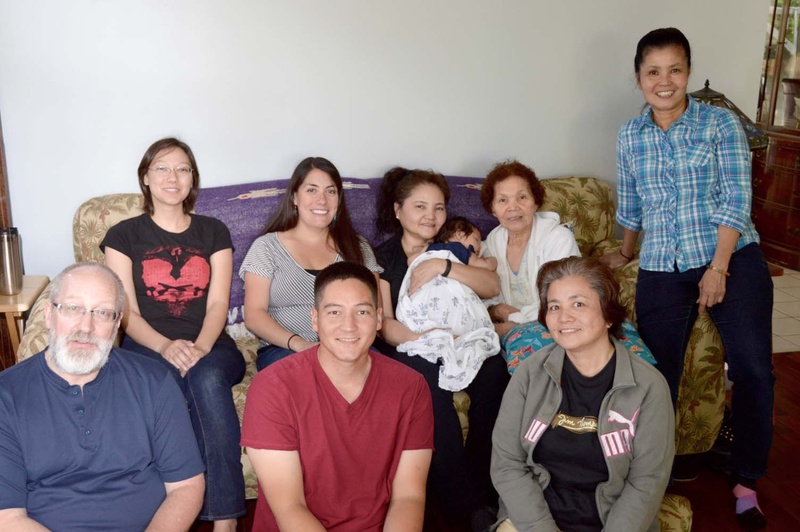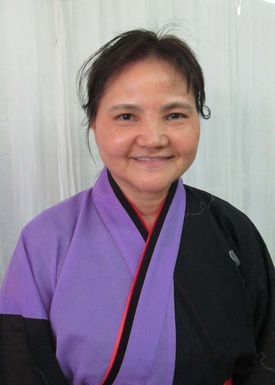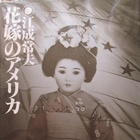The encounter took place near the Futenma base.
The environment surrounding Japanese women who move to America to marry American soldiers changes greatly with the times. Budei Hiromi, who lives in Orange County in Southern California, was born in Naha City, Okinawa Prefecture, and was 56 years old at the time of this interview in May 2016. She met Steve, who was one year older than her, when she was 20 and attending junior college, and married him at 21. She met Steve at a bar that played rock music and was run by a friend and located near the Futenma base where he was stationed. "I happened to be given a large amount of ice cream, so I took it to the store, which had a large refrigerator, and when I took it to the store before opening time, when there should not have been any customers, he was there alone. He asked me, 'Where are you from?'"
Hiromi's first impression of Steve was that he was a "diligent Marine." His job is an air traffic controller, a job that involves controlling fighter jets. As they got to know each other, she was captivated by his kindness.
Steve is a Slavic American from Ohio. He has eight siblings. He dreamed of joining the Marines after graduating from high school and planned to enroll in college after four years in the military. However, he postponed his plans after meeting Hiromi, and the two got married at a young age.
Was there any opposition from her family? Hiromi's father had already died of an illness. "If my father had been alive, I don't think he would have allowed me to marry an American. My mother was against the idea of me going far away to get married, not just because my partner was a soldier. But my grandmother supported my marriage, saying, 'If you go overseas and start a family, your clan will spread all over the world. That would be a wonderful thing.' My mother gave in to my grandmother and eventually forgave me."
After getting married in Okinawa and giving birth to a daughter, the couple moved to the U.S. "I took my daughter and stayed at my parents' house in Ohio for six months. My husband's brother's family lived next door, so it was a lively and fun place. My husband's parents also loved me."
Because she enjoyed living with a large group of people, she felt lonely when she was transferred to South Carolina for work. When asked if she experienced any discrimination as an Asian, due to the nature of the southern region, Hiromi immediately replied that she had never felt that way. "Of course, there were some people in certain areas who treated me strangely, but that was a personal matter and I never paid any attention to it. On the contrary, I was impressed by how friendly the people in the south are, and how the men, known as southern gentlemen, behaved in a gentlemanly manner."
It was my grandmother's support that paved the way
After South Carolina, he was transferred to a base in the Mojave Desert in Southern California. After moving to Okinawa again and spending three and a half years there, he returned to the base in the Mojave Desert and served there for five years before retiring from the military at the age of 38. After working as an air traffic controller, he became a trainer who trained controllers, and finally became a master trainer who trains trainers. After retiring from the military, he worked for a major private company as a technical writer who wrote technical manuals for machinery and equipment.
Furthermore, while they were in the military, both Steve and Hiromi attended college while raising their children. Hiromi graduated with a degree in business administration, while Steve earned a BA in sociology and completed a master's degree. Hiromi currently works as an administrator in charge of customer information management for a company that researches, develops, manufactures and sells dental implants.
On weekends, she attends a Ryukyu dance dojo with her sister, Isoco, who is also married to an American and lives nearby. "I've been dancing for four years now. In Okinawa, it's customary for families to perform arts for each other when there is a celebration. When I go back to Okinawa with my sister, I thought it would be nice to dance a song in front of everyone, so I searched for a Ryukyu dance teacher, and after meeting a wonderful teacher, I thought I'd only do it for two or three months, but I was completely captivated and couldn't stop (laughs)."
She got married at the age of 21 and moved to the United States 35 years ago. Hiromi says she felt like her eyes were opened to the local culture that she had never had the chance to experience before. "If I hadn't left Okinawa, I might never have realized how wonderful the culture of my hometown is."
Their eldest daughter is now 33 and their eldest son is now 31. On their 35th wedding anniversary, we asked Hiromi what she had to say to her husband. "Thank you, after all. We were together at a time when I didn't know anything about society, and there were times when I struggled and found it difficult, but I'm grateful to my husband. We still get along well. What if I hadn't ended up with him? I might have finished junior college in Okinawa and worked in a bank. Most of my high school friends have also become ordinary office ladies in their hometowns."
And it can be said that above all else, Hiromi is where she is today thanks to her grandmother's open-mindedness.
© 2016 Keiko FUkuda








